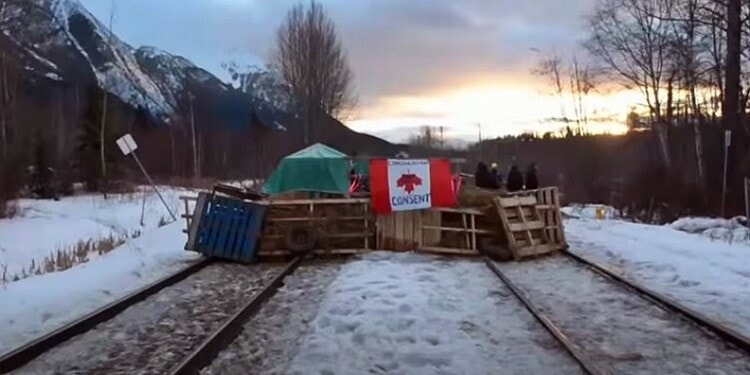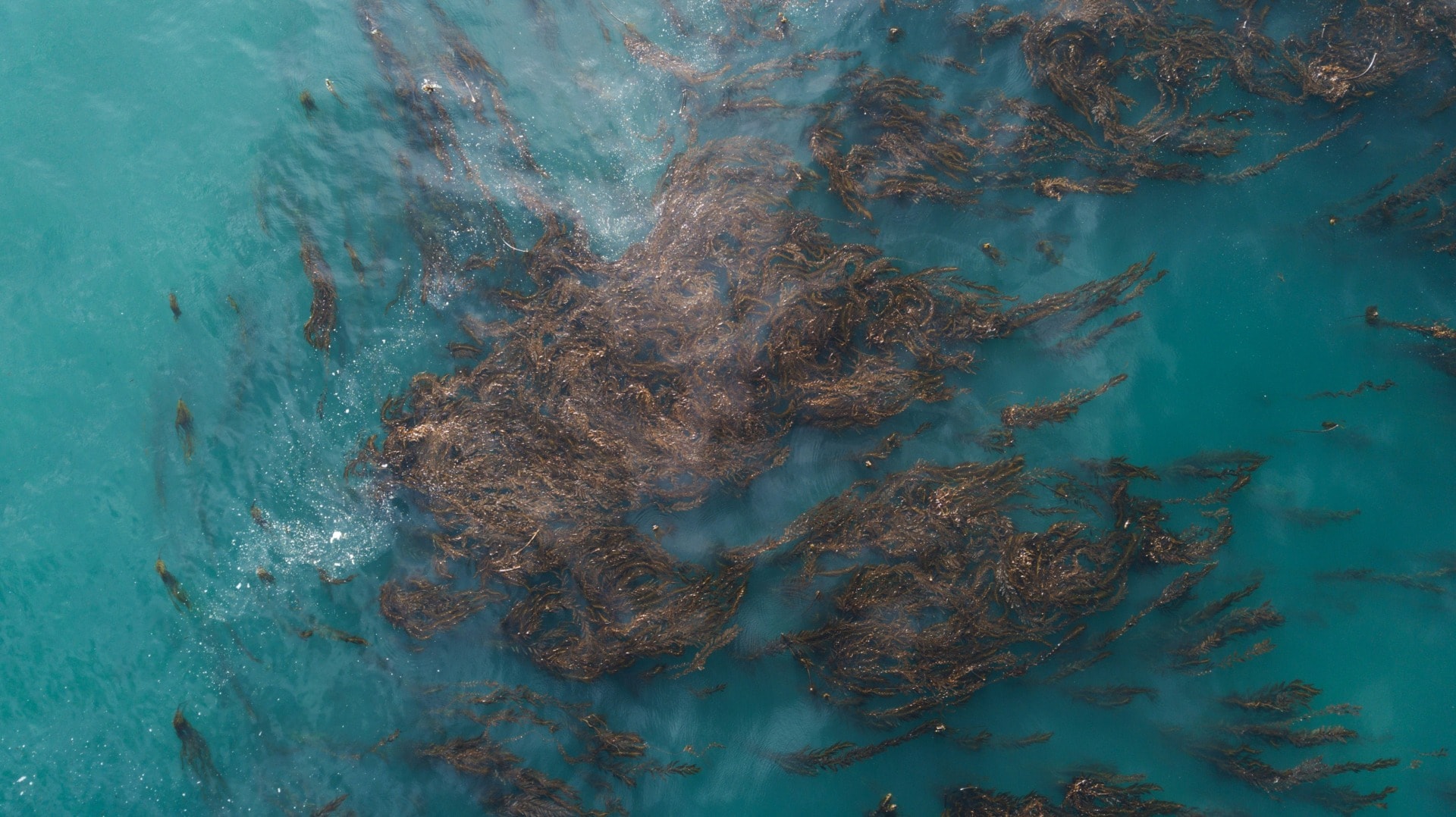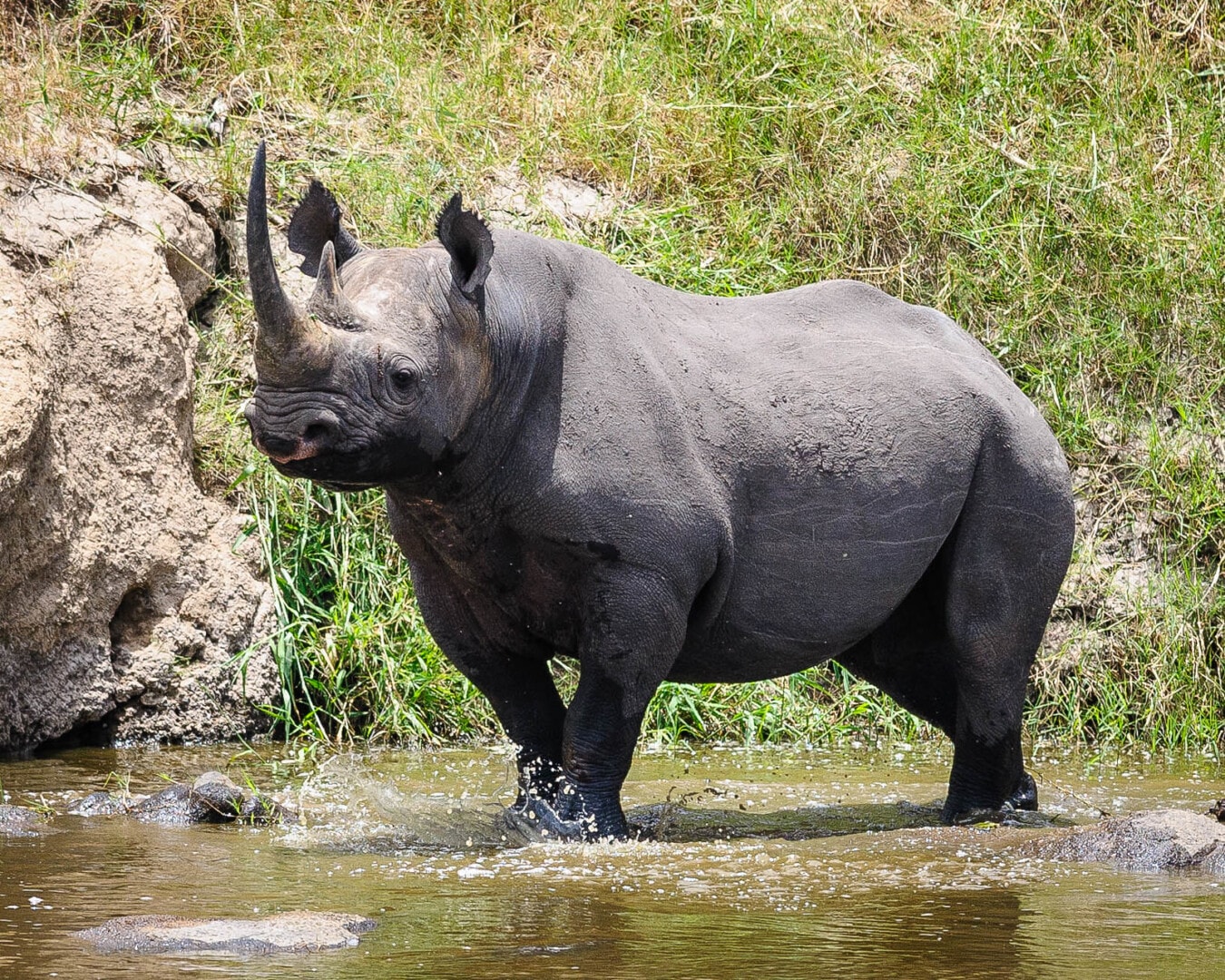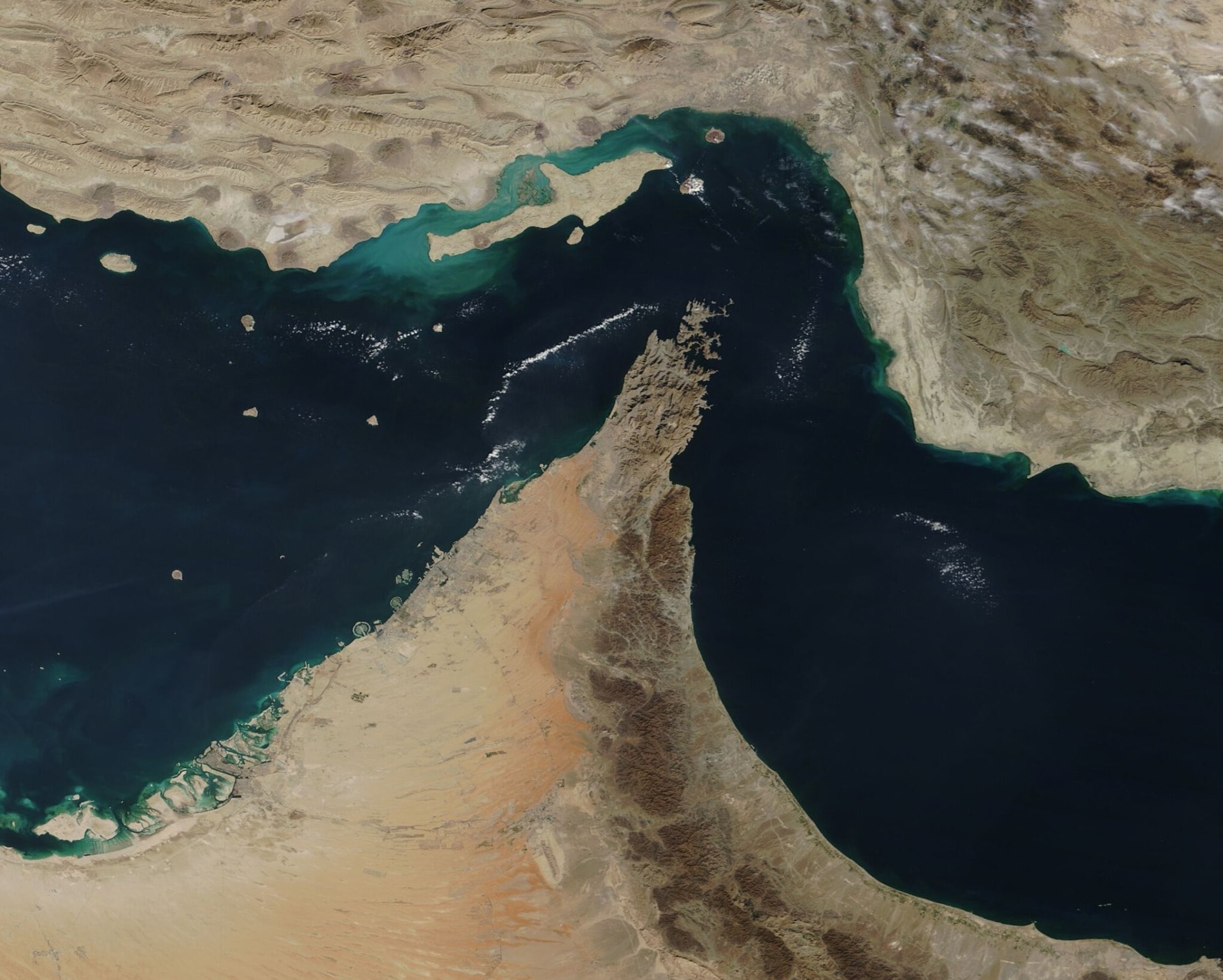More than 65 celebrities and others have signed a letter to The Royal Bank of America to protest against their funding of the Coastal GasLink Pipeline. When finished, the Coastal GasLink Pipeline will run through Wet’suwet’en indigenous territory — land which has never belonged to the Canadian government — and will wreak havoc on both land and water sources the indigenous communities depend on.
Despite protests from Wet’suwet’en hereditary chiefs — who are the rightful landowners — the government has continued to allow the pipeline construction. TC Energy, the company that owns the Coastal GasLink Pipeline, has also used media and Facebook ads to help propagate false Wet’suwet’en support for the construction of the pipeline — deceiving the public.
Celebrities who have already signed the “No More Dirty Banks” campaign letter to protest funding include Mark Ruffalo, Leonardo DiCaprio, Ben Stiller, Scarlett Johansson, Taika Waitii, Jane Fonda, Robert Downery Jr. and others. The campaign’s focus is to push The Royal Bank of America to withdraw its funding from the pipeline, instead of fueling a project that violates indigenous rights.
On the campaign website, Ruffalo explains the precarious situation of the Wet’suwet’en in a video.
“Right now, major banks like the Royal Bank of Canada are financing a fracked gas pipeline bulldozing through the land of the Wet’suwet’en nation in Northern British Columbia, Canada.”
In the letter to Royal Bank of America, celebrities go on to say the “City National Bank’s parent company Royal Bank of Canada is bankrolling the climate crisis and violating the rights of Indigenous Peoples,” and calls for them to “withdraw support from the Coastal GasLink pipeline, effective immediately.”
Pipelines: a menace to the environment
Pipelines are used to transport propane, crude oil and natural gas across land, under streams, rivers and other waterways for easy and fast transportation and distribution. Yet when such chemicals are in contact with the environment, each liquid poses its own complications.
Liquids such as propane can cause fire hazards and even explosions. According to Fractracker, a non-profit organization focused on investigating environmental health hazards, in 2021 alone, 88 pipeline fires and 28 explosions occurred in just one year.
On a more serious note, the transportation of natural gas and crude oil may pose an even bigger threat to the environment than propane.
Similar to propane, natural gas can cause explosions and fires as well as contaminate waterways — killing fish and polluting drinking water.
Crude oil spills also kill wildlife, pollute drinking water and create human health hazards, posing long-term environmental damages. In January of this year, Peru saw one of its biggest oil spills from a pipeline burst transporting crude oil, which resulted in the death of thousands of biodiverse wildlife and killed the fishing industry — a massive toll to the local economy. Oil spills take years to clean and the environmental damage is sometimes irreversible — Peru would be no exception.
In 2021 alone, the United States saw 652 pipeline incidents, resulting in the death of 11 people, injuries to another 36 and about $333 million dollars in damages. From the previous year, February of 2020, Fractracker reported that pipeline incidents went up significantly in 2021 — 2020 seeing 614 pipeline incidents.
Although Fractracker reports the number of incidents and their effect on people, what is not reported from this data is the extensive damage done to ecosystems and indigenous lands across the country, which one could imagine suffer serious repercussions.
Indigenous land is in jeopardy
In 2020, 27 banks from around the world pledged $6.8 billion CAD to fund the Coastal GasLink pipeline — The Royal Bank of America leading the deal. The pipeline, once finished, is supposed to transport natural gas across 416 miles of British Columbia — the majority of it going through Wet’suwet’en land.
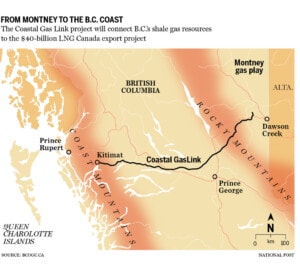
For several years, the Wet’suwet’en have tried to prevent fossil fuel companies from trespassing on their land.
In 1997, the Wet’suwet’en won their first Aboriginal title case in Canadian history, a case victory that stopped clear-cut logging. Since then, the rights defined by the case are still in place, yet logging for pipeline construction is allowed by the Canadian government. Despite the Supreme Court of Canada’s 1997 ruling to recognize the Wet’suwet’en hereditary chiefs as the rightful titleholders of the land, protests from chiefs have continued to be ignored.
As of now, all 20 First Nation councils — Aboriginal indigenous elected officials — have agreed to the project, acting as the “rightful landowners”. Though according to Wet’suwet’en law, all five clans are supposed to agree to the construction of the pipeline and under Canadian law, Wet’suwet’en chiefs are the title-holders, not ” Aboriginal elected officials”.
Violating indigenous rights is not a rare sight, especially when it comes to environmental concerns
In January 2020, the Canadian government spent $20 million dollars on a military raid that deployed snipers, helicopters and police dogs to remove Wet’suwet’en hereditary chiefs and community members from their land during a peaceful blockade to protest the pipeline — at least 14 people were arrested.
In September 2021, Coastal GasLink bulldozed an ancient Wet’suwet’en village site, regardless of the legal requirements and constant call to action from hereditary chiefs to respect the site.
Indigenous abuse is also happening globally. Currently, indigenous communities in Brazil are facing off with the Brazilian government to protect their land from logging in the Amazon — in essence, this is all too common for the Wet’suwet’en people and other indigenous communities.
Oil and Gas companies are Indigenous-washing
For years oil and gas companies have produced false ads that propagate support from indigenous groups — another form of greenwashing called indigenous-washing.
Over the past two years, fossil fuel groups have spent roughly $122,000 CAD on more than 400 Facebook and Instagram ads relating to oil and gas projects across Canada. Last November, these indigenous-washed ads spiked during indigenous land protests against the Coastal GasLink pipeline — clearly showing a lack of support from the Wet’suwet’en.
In fact, recent data collected by Eco-Net.Bot, a research project exposing climate crisis misinformation, analyzed Facebook ads from January 2020 to present-day and found a consistent flow of “indigenous-washing” ads specifically from TC Energy.
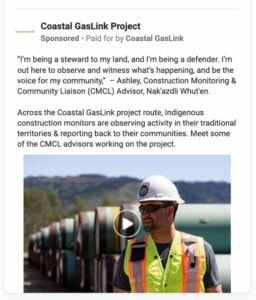
For example, in October of 2021, protests to the Coastal GasLink pipeline occurred after a Wet’suwet’en hereditary chief was arrested for blocking pipeline construction. Subsequently, over the following five weeks, TC Energy and associated groups launched dozens of ads that were projected 1.7 million times across Canada.
On March 10, 2022, TC Energy even announced an alliance on their website with the Wet’suwet’en, stating they would sell a 10% equity interest to the GCL First Nations Limited Partnership. Many believe this could profit the Wet’suwet’en immensely, enhancing their education and their economy, but only First Nation councils have agreed to the alliance, not Wet’suwet’en chiefs who are concerned over the health of their land.
Protests are ramping up as construction closes in
Over the past few years since the Coastal GasLink pipeline was approved in 2020, dozens of peaceful protests have occurred from Wet’suwet’en chiefs, community members and supporters to oppose the construction of the pipeline — but protests have started to get violent from some supporters.
In February, the Coastal GasLink pipeline saw millions of dollars worth of damage to the construction site after an attack was conducted. Vandals included 20 or more masked persons who attacked security guards, threatened workers and significantly damaged equipment.
Despite this rising tension, TC Energy continues to build the Coastal GasLink pipeline and The Royal Bank of America continues to fund a project that propagates indigenous abuse. Protests from the Wet’suwet’en chiefs, community members and supporters seem to be the only thing standing between a finished project and an incomplete one.
With the newfound support of famous celebrities and the “No More Dirty Banks” campaign, hopefully they will finally achieve their goal and be able to cut the pipeline’s funding from the source: This will be a crucial victory and help build even more awareness for a land that is quite literally on the brink of destruction.
To show your support, visit the “No More Dirty Banks” campaign website.
Editor’s Note: The opinions expressed here by Impakter.com columnists are their own, not those of Impakter.com. — In the Featured Photo: Coastal GasLink Pipeline protest. Source: Screenshot from Democracy Now video, https://youtu.be/Tl53FklgkyI.


